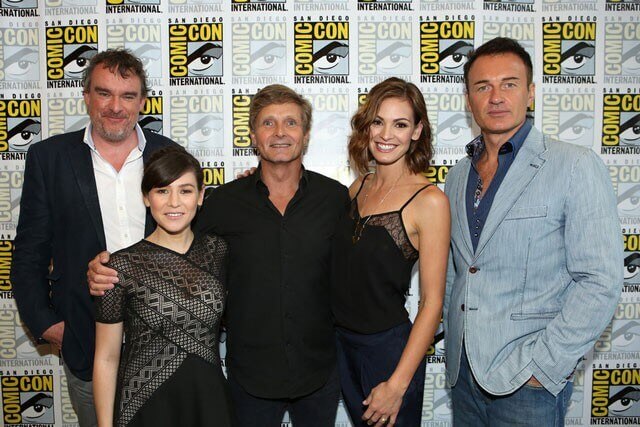
Syfy’s set to bring the classic Arthur C. Clarke novel Childhood’s End to the screen for the first time with a six-hour miniseries based on the 1953 science fiction tale. Clarke’s novel was about an alien invasion, however it differed from most of its genre in that the invaders – called Overlords – were peaceful and shared their advanced knowledge to bring about the end of wars and to establish a new utopia on Earth. In the miniseries, Game of Thrones‘ Charles Dance plays the ambassador of the Overlords, Karellen, and Mike Vogel (Bates Motel, Under the Dome) is Karellen’s first contact on Earthy, Ricky Stormgren.
At the 2015 San Diego Comic Con, screenwriter Matthew Graham (Doctor Who) participated in roundtable interviews to discuss the process of adapting Arthur C. Clarke’s novel for the screen. Graham believes the miniseries format was the right fit for this particular story because it would have been much more difficult to squeeze the entire book into a two-hour movie. “The book is not long but it is epic,” explained Graham. “It covers a huge period of time and it would have been difficult to create that sense of so much time on the Earth passing and our characters evolving. So the miniseries was actually a blessing as a format.”
“Originally it was conceived as a two-parter but then Syfy wanted it to be three nights. The challenge was to find what to put in the second night, really. The first night really presented itself as the opening and the world getting to grips with these benevolent alien overlords. And then the third part was very, very clearly the end game of the story. But the second part was sort of space. When I went through the book again, I found a sort of innocuous paragraph that said, ‘And then the Overlords persuaded mankind to dispense with religion.’ And that’s kind of it. That was it. That was Arthur C. Clarke, ‘and then they dispense with religion.’ And I thought that’s a movie in itself – getting a planet to give up its religious beliefs. So, that became the crux of the second part. From that, we created a new character that’s not in the book, played by Yael Stone, who represented religious belief. It’s through her eyes we sort of tell that story.”
Audiences are accustomed to seeing bleak dystopian futures in both films and TV, but with Childhood’s End the future must look like our hopes and dreams for the world coming true. “It was very hard to get right,” says Graham about creating this attractive new world. “It was a big aesthetic conversation with myself, with Nick [Hurran, the director], and with the designer Phil Ivey, and with the whole team and the studio and the network about how we did it. In the end, we felt it was very important to make a visual impression. That’s why we have the Utopians all wearing roughly the same kind of clothes, the same kind of color palette, which is all beige and white. It kind of seems obvious in some ways, but actually you need to do it. When you see it on screen, it hits you as a statement.”
“What we also came up with was a sort of philosophy for why they’re wearing what they’re wearing. So it’s not as though you have to drink the Kool-aid, you have to get up in the morning and suddenly the Overlords have laid out a new wardrobe for you. It’s just that over time under their watchful gaze, we’ve done away with sweatshops. There are no more sweatshops in India. We talk about this in the show. So our clothing, whatever you’re wearing now you continue wearing until it runs out. And then the stuff that’s left is stuff that’s there to be fairly utilitarian and fairly basic. People no longer have social media so there’s no need to dress to impress. You should dress for comfort. It just felt organic to us. It felt organic that people would start to wear simpler clothes, because they were no longer insecure about where who they were.






